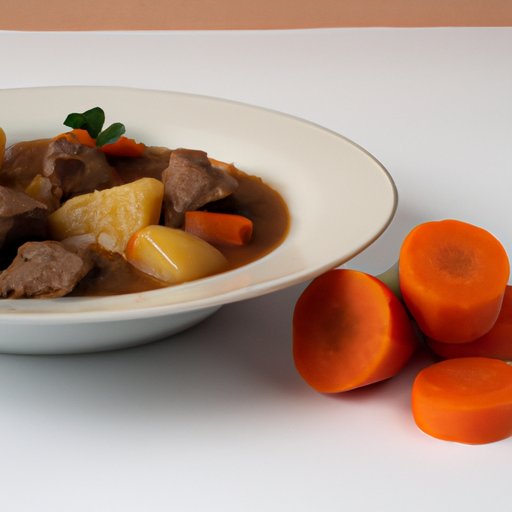Introduction
Beef stew is a classic comfort dish that has been enjoyed by people around the world for centuries. It typically consists of diced beef, potatoes, carrots, celery, onions, and herbs cooked in a rich broth. While it may be delicious, is beef stew really healthy? In this article, we explore the nutritional benefits, health risks and role of beef stew in a balanced diet.
Exploring the Nutritional Benefits of Beef Stew
First, let’s take a look at the nutritional benefits of beef stew. The primary source of nutrition in beef stew is the beef, which is an excellent source of protein. One cup of beef stew can provide up to 30 grams of protein, depending on the amount of beef used. It also contains a variety of vitamins and minerals, including iron, zinc, selenium, niacin, and vitamin B12, all of which are important for overall health.
In terms of calories, a one-cup serving of beef stew provides approximately 300 calories. This is moderate compared to other dishes, making it a suitable option for those who are looking to maintain a healthy weight.

Examining the Health Risks of Eating Beef Stew
While beef stew does offer some nutritional benefits, it is important to consider the potential health risks associated with eating it. The primary concern is the high fat content. Beef stew can contain upwards of 20 grams of fat per serving, which can increase your risk of developing heart disease or other related conditions.
Furthermore, beef stew can be high in sodium, with some varieties containing up to 800 milligrams of sodium per serving. Consuming too much sodium can lead to high blood pressure and an increased risk of stroke and heart attack. Lastly, there is always the potential for contamination when consuming beef, as it can contain bacteria such as E. coli and salmonella.

Analyzing the Role of Beef Stew in a Balanced Diet
When considering whether beef stew is healthy, it is important to analyze its role in a balanced diet. Variety and portion size are key when it comes to maintaining a healthy diet. When preparing beef stew, try to include a variety of ingredients such as vegetables, legumes, and whole grains, in addition to the beef. Additionally, it is important to pay attention to portion size and frequency of consumption. Eating beef stew every day may not be the healthiest choice, but having it occasionally can be part of a well-rounded diet.
Comparing Beef Stew to Other Comfort Food Dishes
When it comes to comfort food, there are many options to choose from. For those looking for a lower calorie alternative to beef stew, there are several options. Grilled chicken with vegetables is a great low-calorie option that is packed with protein and fiber. Another healthier alternative is roasted salmon with sweet potatoes and asparagus. Both options are much lower in calories than beef stew, while still providing essential nutrients.
For those seeking out heart-healthy choices, baked fish with a side of quinoa and steamed vegetables is a great option. Quinoa is a complete protein, and both fish and quinoa are excellent sources of omega-3 fatty acids, which help reduce inflammation and improve heart health. If you’re looking for a nutritionally balanced meal, try a stir-fry with lean proteins, colorful vegetables, and brown rice or quinoa.
Investigating the Impact of Beef Stew on Heart Health
Although beef stew can be part of a healthy diet, it is important to consider its impact on heart health. The high fat content in beef stew can increase cholesterol levels, which can lead to an increased risk of heart disease. Additionally, the high sodium content can increase blood pressure and cause inflammation, both of which can have negative effects on the heart.
Research has shown that individuals who eat diets high in saturated fat and sodium have an increased risk of developing cardiovascular disease. Therefore, it is important to limit your intake of beef stew, or opt for healthier alternatives when possible.

Assessing How Beef Stew Affects Weight Management
Finally, it is important to assess how beef stew affects weight management. While beef stew is not inherently unhealthy, it is high in calories and fat, so it should be consumed in moderation. Furthermore, it is important to pay attention to portion size when consuming beef stew. Eating too much can lead to weight gain, so it is important to practice portion control when enjoying this comfort food.
Additionally, activity level plays an important role in weight management. In order to maintain a healthy weight, it is important to combine a balanced diet with regular physical activity. This will help keep your metabolism running efficiently and prevent weight gain.
Conclusion
In conclusion, beef stew can be part of a healthy diet, but it is important to consider the nutritional benefits, health risks and role of beef stew in a balanced diet. It is high in fat and sodium, so it should be consumed in moderation. Additionally, it is important to pay attention to portion size and frequency of consumption. Finally, it is important to pay attention to your activity level and make sure that you are eating a variety of nutritious foods.
To summarize, beef stew can be a healthy and delicious part of your diet if eaten in moderation and combined with other nutritious foods. However, it is important to consider the potential health risks associated with eating beef stew, and opt for healthier alternatives when possible.
By taking the time to evaluate the nutritional benefits, health risks and role of beef stew in a balanced diet, you can make sure that you are eating this comforting dish responsibly and reaping the maximum health benefits.
(Note: Is this article not meeting your expectations? Do you have knowledge or insights to share? Unlock new opportunities and expand your reach by joining our authors team. Click Registration to join us and share your expertise with our readers.)
